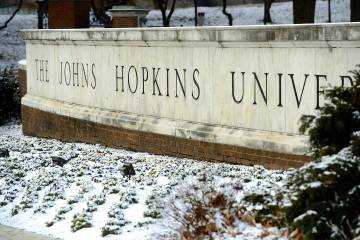In a community message today, Johns Hopkins University leadership announced a plan to preserve and nurture the essential in-person character of the institution's education, research, and service missions, while also codifying the workplace flexibility that emerged for staff in response to the COVID-19 pandemic. The plan also implements new programs and initiatives to answer widespread calls for improvements to the in-person work experience.

Image caption: Pierre Joanis
Image credit: Will Kirk / Johns Hopkins University
The announcement follows a universitywide community feedback and engagement process—including approximately 150 meetings and town halls and 9,000 survey responses. Administrators say the data they collected dovetails with employee feedback: While many staffers remained on-site throughout the pandemic, in general JHU employees are not working in person as much as had been planned a year ago. Employees said a hybrid or remote posture brings many tangible benefits, from saving money on their commute or dependent care to being able to shift their work schedule to meet their individual needs. At the same time, employees said they missed the collaboration and camaraderie that come more naturally with an in-person posture.
The new model aims to course correct in a way that both brings more people back in person more of the time with the help of some significant workplace improvements, while also solidifying the university's commitment to continued workplace flexibility.
"One of the greatest lessons we learned was how resilient our stellar workforce has been—having to quickly pivot to working completely remote for many in our workforce to returning to work on-site or hybrid," says Pierre Joanis, vice president for human resources and a leading figure in higher education human resources. "We also have heard about the impact of decreased in-person interaction on effective teaching, research, and community-building. Ultimately, I think JHU's go-forward flexible work plan balances employee and team preferences, while ensuring that the institution sustains the in-person connections that are critical to our mission."
Read on to hear more from Joanis about the future of work at Johns Hopkins University.
Why is it important for JHU to have more people back in person?
Our employees have done an incredible job of weathering the challenges of the pandemic, adapting to new ways of working and collaborating, and ensuring that the critical work of this institution continues uninterrupted. Many have also embraced the flexibility that comes with working from home or off-site from time to time.
But as one of the world's leading academic research institutions, our character is predicated on in-person interactions among our faculty, staff, students, and neighbors. Fostering and sustaining these connections are vital to our educational, research, and clinical missions, and both staff and faculty are critical to sustaining a vibrant in-person university community. We also heard from our employees that they miss the collaboration and camaraderie that flow from working together in person.
What have your experiences taught you about the most successful individuals and/or organizations and how they work?
Successful organizations seek to hear and understand the needs and motivations of their employees, and they clearly convey the vision and goals of the organization. The magic happens when organizations can leverage the value of the enterprise—its people—to carry out the vision and goals.
We often hear anecdotally that employees who have flexible work options are generally happier and achieve better balance between their professional and personal lives. This can mean that employees have higher rates of engagement, which benefits employers across the board.
As you think about the future of work at Johns Hopkins University, what opportunities do you see for growth and change?
The future of work is really a fascinating topic with many layers, and no employer has figured out the "perfect" go-forward plan for its employees. But JHU's plan may potentially become a model that works for others—our peers and nonacademic institutions alike—to move ahead.
The feedback that employees shared in the Future of Work survey, listening sessions, and town hall meetings gave leadership insight into areas that need improvement, in particular, areas that involve on-site/on-campus amenities such as access to food options, better space utilization, technology improvements for meeting rooms, and more opportunities to gather in person for JHU-sponsored events and activities. We're also looking for innovative ways to recruit and retain employees, such as considering the development of fully remote job descriptions for positions like IT professionals whose roles don't require an on-site presence.
As we move toward greater on-site work and collaboration, university leadership is committed to ensuring that employees' on-site experience is positive. As such, we are taking steps to make changes and enhancements.
How would you describe the university's approach to how we work moving forward, and how does Hopkins compare with peer universities?
We found some commonalities between peer universities, including their efforts to create and increase programs and toolkits for employees related to career development, worklife and well-being, and their creative approaches to flexible work that extend beyond work modalities. For instance, peers like Cornell have "Summer Fridays," during which you work a shortened or half day on Fridays in the summer months. Moving forward, JHU will work with departments and divisions to explore piloting small flexible work projects such as this, understanding that flexible work isn't exclusive to employees' work locations.
Are there existing programs supporting worklife balance that are underutilized or deserve more attention?
JHU has a variety of existing programs that support the physical, mental, emotional, social, and financial well-being of employees. These programs are part of JHU's Healthy@Hopkins program. For instance, Burnalong is a platform where employees can take free courses in physical fitness, meditation, and nutrition. There are a number of free mental and emotional health resources available through the Calm app and the Johns Hopkins Employee Assistance Program; employees can manage their financial well-being with one-on-one coaching and consultations with financial advisers. And there are a number of JHU support groups and community and volunteer engagement opportunities—all free and available to employees. We also anticipate bringing back on-campus activities, like annual fitness challenges, and exploring new programs that are responsive to employees' diverse, holistic needs.
For employees who may be returning to work on-site more often, there are resources for things like help finding and paying for dependent care, including child care scholarships and subsidies for employees based on income. There's also continuous guidance on COVID health and safety. Our goal in the coming weeks and months is to improve promotion of our existing programs so that employees know that they continue to have these resources available to them.
What does the university need to do to remain competitive in attracting the best and brightest employees, from support staff to tenured faculty?
JHU Human Resources is committed to supporting the entire workforce through the various transitions associated with employment here, including every stage of personal and professional career growth and development.
To attract and recruit brilliant and diverse talent to Hopkins, we're developing a more transparent and streamlined job classification system so that current and prospective employees can easily map their internal career path to advance and grow. We are calling this effort the Career Architecture program. This will enable and encourage talent to continue to grow in their careers at Hopkins, which benefits the enterprise because we're able to retain their talent and institutional knowledge. We are also in the development phase of the university staff council, a body that will create more opportunity for meaningful engagement for staff here at the university.
Additionally, conducting periodic market reviews for compensation and enhancing programs and initiatives that support employees' unique needs are critical to ensure we can be the employer of choice.
Posted in News+Info
Tagged human resources, future of work









